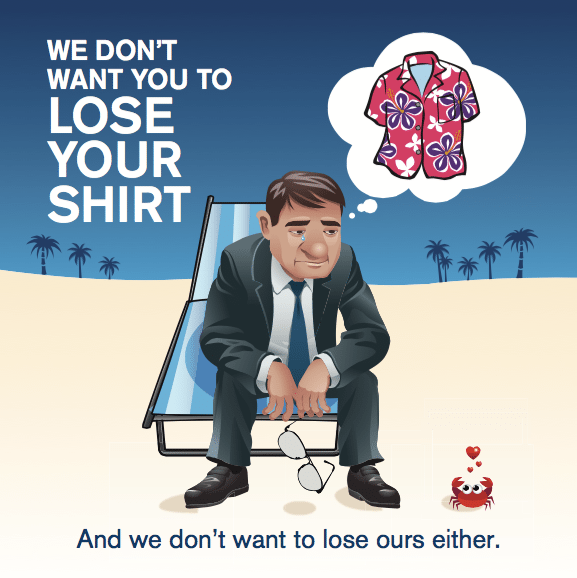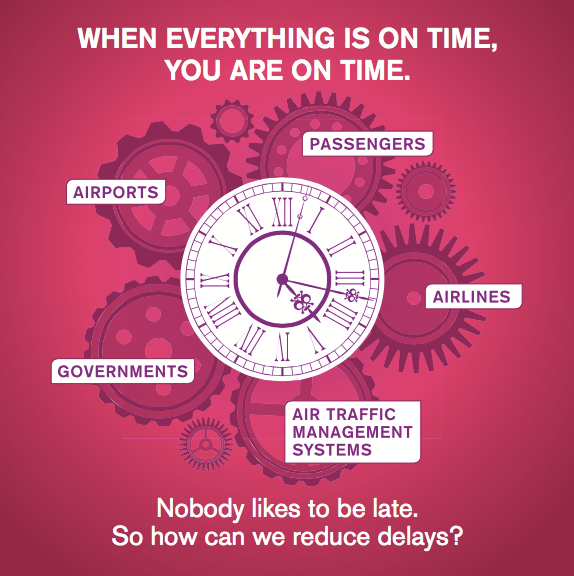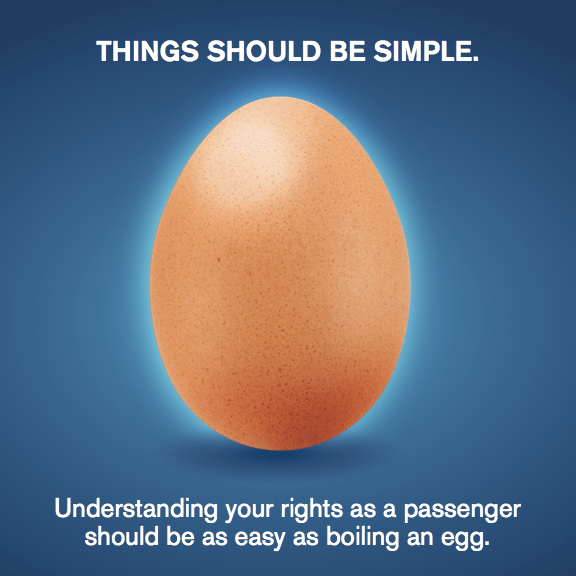Skift Take
There is big money to be made here for whatever communications firm can help airlines carry a winning message, without making an omelette of it. But some of the more disingenuous arguments the organization makes will prove a pickle for whatever firm tries.
The International Air Transport Association (IATA) is taking another stab at making its position on various consumer rights protections established throughout the world.
This time they’ve resorted to postcards and posters of shirts, timers, and eggs.
“Many regulators are adopting passenger rights regimes—some of which come close to dictating product design and marketing. Worse, there is no international coordination. When things go wrong, passenger need clarity, not confusion,” said Tony Tyler, IATA’s Director General and CEO during this week’s IATA General Meeting.
Thus, the birth of the organization’s latest campaign to engage consumers with the new media of postcards and posters.
We Don’t Want You To Lose Your Shirt

“Lost baggage is a pain for passengers and costly for airlines. Airlines are already investing in baggage handling and tracking solutions that will make sure you and your bag arrive together – so you don’t have to worry about losing your shirt …or your socks and shoes.”/IATA
When Everything is on Time, You are On Time

“Any approach to address delays should involve everyone in the picture. So that, together, we can improve on-time performance. And when delays do happen, we can help ensure that passengers are properly cared for.”/IATA
Things Should Be Simple

“On many international journeys, it is difficult to know what rules apply. Over 60 countries have their own consumer protection regulations…and they aren’t coordinated with each other. Governments can address this problem by working together on a more coordinated approach — so passengers know what to expect when things go wrong.”/IATA
This new campaign aims to communicate IATA’s core principles on consumer protections, as quoted from IATA’s announcement:
- Calling for regulations to be clear so that passengers can understand their rights
- Calling on airlines to ensure that their passengers are always kept informed and to establish efficient complaint handling procedures
- Calling for passenger entitlements to be proportional in a situation of service breakdown
- Calling for governments to be consistent when regulating, so that airlines and consumers no longer need to contend with further contradictory passenger rights regimes around the world.
The High Costs of Not Flying
For IATA members, and other airlines, there’s big money at stake. Consumer protections added to the books by the U.S. Department of Transportation and the European Council, for example, can result in punitive fines and liabilities to compensate passengers during service disruptions. These regulations can cost airlines many multiples of the original fare the passenger paid to fly.
A passenger who books a low-fare ticket, say for $49.00, might still have to be given meal coupons for flight delays, overnight hotel arrangements, alternate transport and other other compensation which could cost an airline in excess of $490.00, depending on where that flight takes place and the cause for the delay. For an industry making an average of $8.27 on every ticket, this level of liability is just not sustainable.
What is more the rules applied to aviation don’t match rules applied to other forms of mass transport. In the European Union, for example, where rail transport is readily available and the infrastructure massive, and where airlines closely compete with trains for customers, the train operators don’t face the same service liability as airlines for service disruptions.
These are only two examples of what IATA member airlines, and other non-IATA airlines, object to.
The Regulatory Jumble
IATA points out that over 60 countries have passed some form of passenger rights regulations, with more countries considering new rules, and that each of these regulations carries with it different levels of liability.
“The growing patchwork of consumer rights regimes is leaving travelers confused when they are subject to multiple different passenger rights regimes at the same time. We need an air transport system that balances the need to protect consumers while allowing the airline industry to compete and innovate,” Paul Steele, IATA’s Senior Vice President for Member and External Relations, says. “Looking at the nature of some of the regulations being produced, it seems that some governments are ignoring basic commercial principles. And they are producing regulations that do not address the root causes of many travel disruptions.”
Market Forces
A big hurdle for IATA members to overcome is the push to let natural “market forces” determine how far airlines need to go to address passenger needs.
IATA proposes in its Consumer Protection Core Principles policy document:
“Governments should consider acknowledging voluntary industry commitments; government regulations should form the ‘lowest common denominator’ and market forces should be allowed to determine additional standards of service levels.”
As Steele puts it: “Consumer protection is not about winners and losers. Everybody wants the passenger to get to his or her destination safely and on schedule. And in an intensely competitive business such as aviation, when things go wrong, airlines have a natural incentive to keep their customers happy—as is the case in any service industry.”
In theory, airlines would compete to keep passengers happy and avoid negative press on service issues which could damage their quality brand image.
This language is problematic for ordinary passengers, and consumer rights groups which have fought for passenger rights protections ranging from ordinary travel delays and service disruptions, to the accommodations of special needs passengers.
It also worries the 60+ governments drafting regulations which don’t agree that market forces will result in fair treatment of passengers.
Moving forward, IATA will need to effectively communicate how market forces can address these needs, without putting the airline industry out of business. The full argument may not fit on the back of a postcard.
The Daily Newsletter
Our daily coverage of the global travel industry. Written by editors and analysts from across Skift’s brands.
Have a confidential tip for Skift? Get in touch
Photo credit: Passengers queue in Terminal 3 at Heathrow Airport in west London. 126696 / 126696